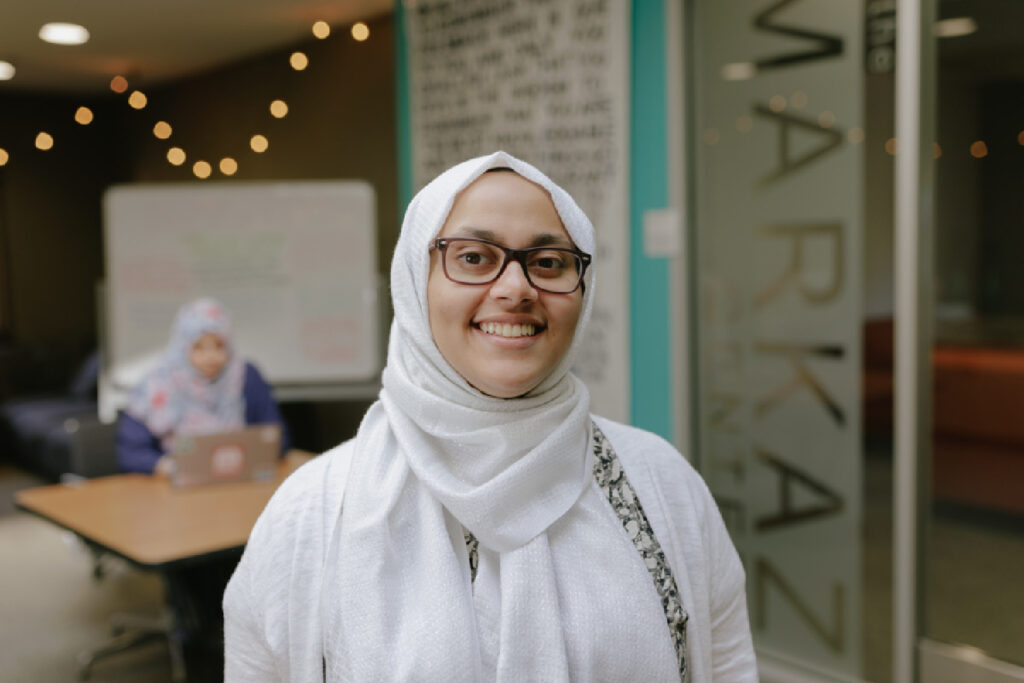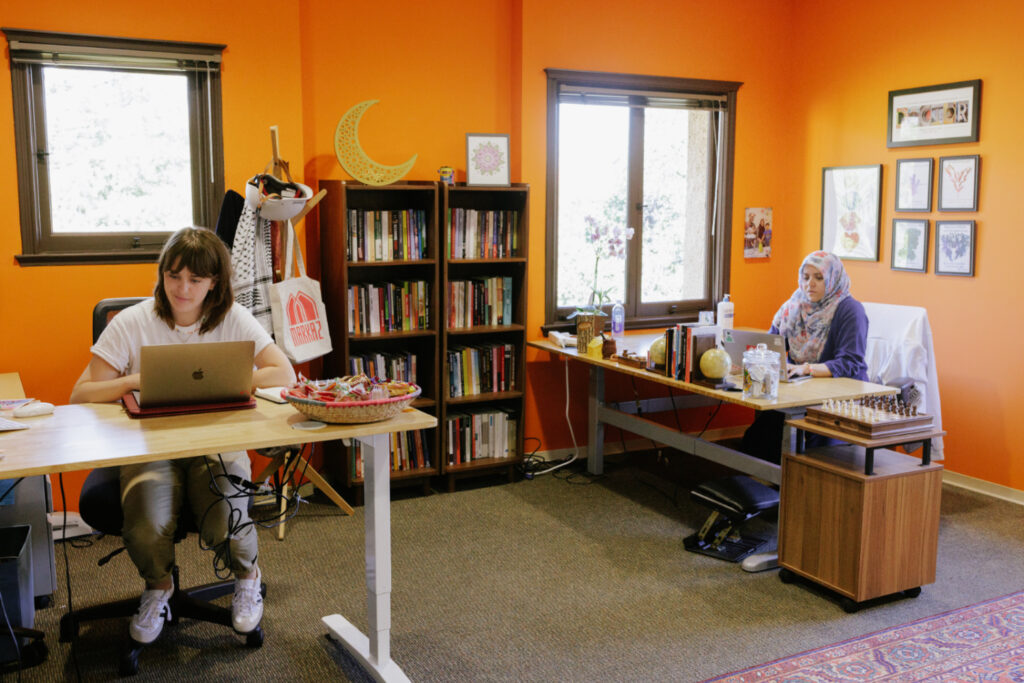Supporting Muslim students’ mental health
New therapy and consultation services, along with community programming and online resources, reflect research by and for Stanford students.

Senior Muslim Mental Health Initiative (MMHI) Fellow Aneeqa Abid at The Markaz Resource Center. (Image credit: Micaela Go)
Bolstered by new research out of a unique Stanford lab and the Markaz Resource Center, Stanford is taking steps to improve mental health services and outcomes for Muslim students.
“This is a transitional age group,” Rania Awaad, clinical associate professor in the Stanford Medicine Department of Psychiatry and Behavioral Sciences, of the 18- to 24-year-olds who make up the bulk of Stanford students. “They are moving into new spaces, new friends, people, and experiences. In all of those transitions, we noticed that for minority groups, there was just not a lot of support from people who looked like them or understood their transitions.”
To help address this, the Markaz is now helping oversee Stanford’s partnership with Maristan, a local organization that offers therapy and consultation services with Muslim clinicians. Maristan will offer both one-on-one therapy and collective support group sessions for Stanford students, as well as training on Muslim mental health for CAPS and other Stanford staff.
“This is part of a broader effort to provide culturally responsive mental health services for Stanford’s undergraduate, graduate and professional students — and make sure students know how to access them,” said Vice Provost for Student Affairs Susie Brubaker-Cole.
For example, Counseling and Psychological Services continues to expand its culturally-sensitive practices, customized clinical services, and community-focused programming, including its popular Let’s Talk in Community partnership with Stanford’s Centers for Equity, Community and Leadership.
For and by students
Mahnoor Hyat and Aneeqa Abid, both of the Class of 2022, were acutely familiar with these issues. As frosh experience coordinator for the Markaz, Abid heard from students who felt isolated or singled out because of their Muslim identity. Hyat, who was a Bridge peer counselor, found that when Muslim students called for support and learned that she too was from a Muslim family, they would open up about issues such as family pressure.
Both Hyat and Abid also worked in the Muslim Mental Health & Islamic Psychology Lab, which is part of Stanford Medicine and is directed by Awaad, so they had research-based knowledge of the issues in addition to a personal connection.
“I’m doing all this research while students in my own community are struggling,” Abid said. “I wanted to do something about this.”
They decided to turn their knowledge into action that was backed up by research. As Muslim mental health coordinators for the Markaz, they spent a year researching the mental health needs of Muslim students on campus, and the following year transformed their research into programming.
A warm hand-off
“Because of the prevalence of stigma, we have launched a destigmatizing mental health campaign,” Hyat said. They collected anonymous stories about mental health diagnoses, as well as stories that will help to demystify therapy, and they worked with a team of interns to share them through newsletters, websites and social media.
“One finding was that a lot of the students don’t even know how to navigate the mental health system at Stanford or what resources are available to them,” said Abiya Ahmed, associate dean of students and director of the Markaz.
To address this, Hyat and Abid also produced a series of short videos offering easily consumable information on how to access mental health services on campus, starting with a series of videos on care provided at CAPS. They will highlight other on-campus providers of mental health care, groups and workshops that may be helpful, as well as how to navigate insurance and financial concerns.
Ultimately, they hope that their research can lead to a robust Muslim Mental Health Initiative (MMHI) program at Stanford. The MMHI is a project of Awaad’s lab, which has 30 researchers and is the only one of its kind in the country.
Awaad said she founded the lab when she joined the medical school faculty because “there weren’t dedicated lines of research on Muslims and mental health and, more broadly, on faith and mental health.”
The MMHI, which is being implemented on several university campuses, offers mental health consultations and referrals to higher-level care for Muslim students, as well as support groups, workshops, and training for university staff.
The goal is to connect those who need longer-term support with resources on campus or in the community. “It’s a warm hand-off – it’s that bridge that helps the Muslim students who, because of the stigma and the lack of people that represent them, wouldn’t access mental health services,” Awaad said.

The Markaz Associate Director Cassie Garcia and Director Abiya Ahmed working inside Stanford’s community center for Muslim students. (Image credit: Micaela Go)
Based on Stanford-specific research
One key difference between the MMHI program here and those implemented at other campuses: Stanford’s is starting with Stanford-specific research.
Hyat and Abid talked to about 36 Muslim students — undergraduates and graduate students, some currently practicing and some more culturally oriented — in small groups to find out about their mental health experiences. They have presented the results already and hope to publish them — and they are also using them to guide the implementation of the MMHI on campus, including mental-health consultations with Muslim therapists via a pilot program.
Although Muslim students face many of the same mental health challenges as other students, there are some additional pressures related to navigating the Muslim experience on campus. These include external factors, such as discrimination and a lack of Muslim representation, and more internally focused challenges, such as relationships with family members and expectations about marriage and relationships.
Mahnoor and Abid also found that when it comes to mental health, the role of spirituality and religiosity feels unparalleled – both as a help and a hindrance. “The role of spirituality and religiosity is very nuanced, and therapists need to be aware of this nuance,” Hyat said.
Many of the students said they wanted to work with a therapist who either identified as Muslim or was very familiar with Muslim culture.
“They didn’t want to spend a lot of their counseling sessions explaining what the cultural baggage was,” Ahmed said. “They needed someone who already had the background and who would understand all the nuances of their mental health struggles and experiences.”
About 20 percent of respondents said there is a stigma surrounding mental health problems, though others said there isn’t, particularly at Stanford. Many said that community programs play a positive role in promoting mental health, and they cited community-building programming initiated by The Markaz as an example.
“Community programs play a really positive role in people’s mental health,” Hyat said. “A lot of well-being comes from having a community they can rely on. The Markaz came up a lot as a source of solace.”